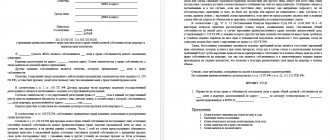Often, in times of financial crisis, people do not have enough money to pay even utility bills on time. In addition, constantly rising tariffs make it difficult to pay bills on time. As a result, people develop debts that grow every month and become more and more unaffordable for the payer.
The management company, in turn, does not want to have debtors, so when a large debt accumulates, lawsuits are often filed against the defaulter. Read this article about how to sue the management company and when it can sue.
How long can you avoid paying utilities?
The rules for making payments for an apartment are established by Part 1 of Art. 153 (hereinafter referred to as the RF Housing Code). Rent must be paid by the 10th of each month, unless a different date has been established, for example, by the homeowners association.
Failure to meet payment deadlines is illegal. In case of arrears in utility bills, the period for recording the violation does not matter. Of course, if a tenant pays for housing and communal services a couple of days late, then most likely the management organization will not attach any importance to this fact. However, even a minimal delay in payment is a legal basis for the accrual of penalties.
If the consumer is late with payment for 3 months or more, the provision of services may be suspended, for example, by turning off gas or electricity.
Learn more about how much you can avoid paying for an apartment.
How to find out the amount of debt
The amount of debt can be found out from the receipt for payment of the apartment. It is issued monthly by the service organization or service provider, such as an energy company.
If for some reason a tenant has not received a payment, to identify the existing debt for utilities, you can:
- personally contact the supplier or obtain information on its website regarding your personal account or address;
- visit the office of the service organization or check the data in your personal account on its Internet resource;
- use the Internet banking system or ATMs;
- register on and in your personal account select “Payment for housing and communal services”.
Legal regulation
The rules for calculating payments for utility services and their payment are established by the Housing Code of the Russian Federation and the stop of the Government of the Russian Federation dated 05/06/11 No. 354 “On the provision of utility services” (hereinafter referred to as Resolution No. 354). For example, sub. “and” paragraph 34 of Resolution No. 354 emphasizes the need for full and timely payment of utilities.
The Housing Code of the Russian Federation provides for the right to provide subsidies to citizens whose financial situation does not allow them to pay housing and communal services in full.
For violation of the payment deadline, in accordance with Part 14 of Art. 155 of the Housing Code of the Russian Federation and on the basis of the provisions, the accrual of penalties is provided. By the way, the latest legislative act has made many changes to the situation of debtors.
If the accrual of penalties does not encourage the tenant to voluntarily pay for services, the issue of forced collection will be decided. To simplify this procedure, a new law was adopted regarding the order of writ proceedings.
The management company filed a lawsuit for non-payment of utilities. What to do?
What to do if the management company sues for non-payment of utilities, and what legal consequences can a defaulter expect in this situation?
Failure to pay bills for supplied housing and communal services can lead to the most negative consequences for residents of apartment buildings, including litigation. At the same time, the management company that has entered into an agreement for the maintenance of a residential building has the right to demand in court to evict the unreliable tenant for non-payment of bills. This is an extreme measure, but it has its place.
Important: the management company can contact the defaulter directly after three missed payment deadlines, but in order to go to court, at least 6 unpaid invoices must accumulate.
Can housing and communal services sue?
Even before the decision is made to collect the debt through the court, adverse consequences already occur for the defaulter.
From the first day of delay on current accounts, the payer is subject to a fine . Traditionally, after the 10th day of each month, the countdown for late payments begins. For each day according to Art. 155 of the Housing Code of the Russian Federation, a penalty is charged on the amount of the debt. The purpose of such punishment is to encourage the defaulter to repay the resulting debts as soon as possible.
Much more stringent enforcement measures will be taken by the housing and communal services when debts accumulate over six months . At the same time, not only homeowners will experience them, but also those who live in municipal apartments under social tenancy agreements and in service apartments. In any case, the debts will be repaid, only the amount will grow with each day of delay.
By the time the debt period begins to approach 6 months, the management company will begin to send appropriate notifications to the debtors. They will indicate the current amount of the debt, including the amount of penalties, and also indicate the actions that will be taken after the expiration of the specified debt repayment period.
At this time, it is still possible to resolve the case peacefully and without going to court. This is beneficial not only for the management company, but also for the debtor. Negotiations should establish whether the company is ready to restructure the existing debt. In this case, the debtor has a chance to pay off the debts in feasible payments, without prosecution.
If the debtor does not respond in any way to the housing and communal services letters, does not pay off debts and penalties, then the result of all this will be a summons to court. After a trial in the district court, residents who have accumulated debts will be required to pay not only the debt itself, but also penalties. In this case, no one will offer installment payments.
If the apartment is owned
In relation to residents of an apartment building who are the owners of their homes, management companies can use, in addition to going to court, another effective method of pressure.
Thus, nothing prevents utility companies from simply blocking debtors’ access to utility services. This opportunity is provided to the Housing and Communal Services by the Rules for the Provision of Public Utilities, approved on May 6, 2011 by Government Resolution No. 354.
The rules state: the debtor can stop supplying utility services until he has fully repaid the currently accrued debt on his bills. Moreover, at first supplies are limited, and then completely stopped.
You cannot turn off the supply of cold water and heating , but nothing prevents utility workers from disconnecting the debtor’s apartment from electricity, as well as turning off the valve on the gas pipe. Of course, all this is done in a certain order.
According to clause 119 of the Rules, the management company is obliged to notify the debtor one month in advance that restrictive measures will be taken against him. The period is counted from the date of delivery of the notice to the debtor by mail or in person. The last warning will be given 3 days before the expected shutdown date. Finally, on the day of the shutdown, a final – third – notice will be given.
If the apartment is municipal
Those who live in apartment buildings under social tenancy agreements are in a much less protected position than those who managed to register ownership of their housing. No one has the right to evict the owner from his apartment, not even the court. Under certain circumstances, an apartment may be forced to be sold in order to pay off debts, but it is impossible to take it away to pay off the debt.
For residents of municipal apartments, housing and communal services debt can become a reason for eviction. In Art. 90 of the Housing Code of the Russian Federation directly states that after six months of rent arrears, debtors may be subject to a penalty in the form of forced eviction.
One way or another, eviction always occurs only in court . In this case, in exchange for the current living space, the debtor, again at the expense of the municipality, must be provided with other housing.
Its size must correspond only to the social norm established for a given region for each resident. But (!) the obligation to pay debts does not cancel the eviction; they will still have to be paid.
Are there good reasons for debt?
As a rule, utility companies are ready to enter into the position of a debtor, especially when the reason for the debt is actually very valid. These reasons will certainly be taken into account during the trial. Among these, of course, valid reasons for late payment for housing and communal services, we can list:
- Long-term illness of the payer, during which he does not receive wages.
- Dismissal from work due to staff reduction, liquidation or bankruptcy of the enterprise, etc.
- Long delay in payment of wages.
- Difficult financial situation of the family caused by other valid reasons.
If it is confirmed in court that such reasons actually exist, and the amount of rent exceeds 22% of the family’s total earnings, then a subsidy can be issued. This subsidy will make it possible to pay bills in a smaller amount within six months and thereby overcome the financial crisis.
What to do if housing and communal services sued for non-payment
If, nevertheless, the worst case scenario has come, and the management company has filed a lawsuit for non-payment , then the main thing is not to panic under any circumstances and begin preparing for the scheduled court hearing. Both parties have the right to protect their interests and present arguments in their favor.
The first thing to do is pay off the debt. If the debtor appears in court with paid receipts, this will significantly simplify the matter, and it will be possible to get away with much less consequences.
If, after all, there is no way to repay the debts, then you will need to very carefully select documents to prove the valid reasons for the formation of the debt. You can apply to the court to be able to pay off the debt in installments. In the event of favorable developments, these payments will need to be paid every month along with current receipts.
The worst case scenario: the debtor did not appear in court, did not pay the debt, and does not want to contact the housing and communal services and the court. In this case, the court decision will be made in absentia, and its execution will be carried out by the Bailiff Service.
And in this case, the last opportunity remains to file a petition with the court for an installment plan or deferred payment, but it will be granted only if documents are provided confirming good reasons for absence from court hearings.
If you still have any questions or need help in preparing documents for the court, then our online duty lawyer is at your service.
Source: https://law03.ru/housing/article/uk-podala-v-sud-za-neuplatu-kommunalnyx-uslug
From whom is the rent debt collected?
All resources are provided to consumers on a reimbursable basis. In Part 2 of Art. 153 of the RF Housing Code contains an exhaustive list of payers. These include individuals and legal entities, in particular:
- Tenants of housing under a social tenancy agreement.
- Tenants of an apartment in state or municipal housing stock.
- Members of a housing cooperative.
- Owners of the premises.
- Persons who accepted premises from the developer under a transfer deed.
- Developers of premises put into operation, but not transferred to the future owner.
- Government agencies or local governments until residents move into apartments of their funds.
Consequently, the law provides not only for the forced payment of debt by the population, but also for the collection of utility bills from the administration of the municipality if the apartment is in its ownership.
Is there joint liability for utility debt?
Housing legislation contains the concept of joint and several liability. If the apartment belongs to one of the spouses, but the whole family is registered and lives in it, in the event of a utility debt, collection can be directed not only to the owner, but also to his relatives.
Joint and several collection of debts for housing and communal services assumes that not only the person for whom contracts and bills are drawn up, but also all persons registered in the apartment are obliged to pay them. Thus, the debt can be recovered in whole or in part from one of the tenants or from all in certain shares.
Find out more about what joint and several liability for utility debts means.
Collusion with the debtor
There was a small problem.
When I came to pay the fee, they began to chase me from office to office, and everyone tried to ask me about the debt. Of course this made me angry. Can't you just take it and pay!? “My” lawyer was just on vacation.
I said it as it is - that we agreed, and I’m not going to tell you, whom I’m seeing for the first time, about my problems. And there are rooms with aunts, and everyone is wide-eyed.
In the end, I paid 454 rubles and left.
The next day my lawyer calls me and starts asking me what I said there. It turned out that she was accused of colluding with the debtor, and they even wanted to fire her!
In short, everything is a mess. But it looks like she wasn't fired.
What do you do when you are sued? And did I do everything right? Write in the comments!
Pre-trial methods of collection
If a tenant does not pay rent for a long time, the service organization or service provider will certainly have a question about how to collect the debt through the court. However, both parties are interested in pre-trial measures to resolve the problem, which include the following stages:
- drawing up a claim addressed to the debtor;
- notification of the debt and the need for repayment;
- conclusion of a debt restructuring agreement;
- warning about the possibility of turning off gas, water, electricity;
- disconnection of utilities for non-payment if the payment period exceeds 90 days.
Claim against the debtor
Sending a claim to the debtor in housing and communal disputes is not a mandatory step. The plaintiff may initiate litigation without this pre-trial measure. But since many defaulters simply do not think about the consequences of their actions, often a reminder of them is enough.
In order for the measure to take effect, it is necessary:
- State the essence of the dispute, providing complete information about the period and amount of the debt.
- Offer to pay utility bills voluntarily.
- Mention the possibility of debt restructuring.
- List the consequences of ignoring a claim:
- legal dispute;
- the debtor's expenses for a representative and other legal costs;
- enforcement proceedings with the prospect of an inventory of property.
The claim might look like this:
Notifying the tenant about the existence of a debt
The notice of debt is for informational purposes only. This document is usually sent 3 months from the date of debt formation. The notice should indicate:
- name and details of the management organization;
- details of the defaulter;
- amount of debt;
- the period of its formation;
- the amount of additional charges in the form of penalties (penalties);
- repayment terms;
- time of meeting to clarify the circumstances;
- the possibility of receiving a subsidy;
- consequences of non-payment, for example, disconnection of services;
- date of document preparation.
The notice can be delivered to the debtor personally against signature or sent by registered mail with return receipt requested.
In the event of a standard delay in payment, penalties for late utility payments in 2021 are calculated in accordance with Part 14 of Art. 155 Housing Code of the Russian Federation:
- if the payment is not made from 31 to 90 days after the last payment, 1/300 of the refinancing rate is charged for each day (that is, 1/300 of 7.5%);
- after 91 days of late payment, the interest will be 1/130 of the refinancing rate (1/130 of 7.5%).
A meeting with the debtor will allow you to find out why he does not pay utility bills. Sometimes this is caused by circumstances beyond his personal control, for example, loss of legal capacity.
Agreement on debt restructuring for housing and communal services
If non-payment is due to valid reasons, an agreement can be concluded with the tenant on debt restructuring - dividing the amount due into several parts. Each of them is repaid within a certain period. This allows you to pay off the entire debt in a manner acceptable to the debtor.
After this, the debt on payments for living space, including penalties, will be considered closed. Signing such an agreement is the right of the management organization, because it undertakes a reciprocal obligation to ensure the uninterrupted provision of the apartment with all resources.
More about how housing and communal services debt is being restructured.
Consequences of non-payment of utilities
It is not recommended to wait until the debt grows to 300 thousand: if you have problems repaying housing and communal services, it is better to contact the supplier directly. But some categories of citizens of the Russian Federation have the right not to pay utility bills completely or partially. These are beneficiaries who are allowed by the state to reduce the cost of maintaining their property by up to 100%.
Legal methods of non-payment
Housing and communal services services, after a written warning (3 days in advance), send an employee who blocks the supply of electricity, gas, and water to the debtor. Heating is a service that utility companies will not be able to turn off, even if there is a debt. The rule is stated in the Decree of the Government of the Russian Federation of August 8, 2012 No. 808. Restrictive actions can only be applied in the event of a temporary elimination of the malfunction. Complete isolation and termination of the contract cannot be carried out only at the initiative of the housing and communal services supplier.
- identifying the period during which the user does not pay for utilities (at least 3 months);
- preliminary notification by sending a letter to the address where the service was provided or by posting a list of debtors (the law on utility debts requires the supplier to provide written evidence of compliance with the notification procedure, so registered letters with return receipt are often sent);
- if within the next 30 days there is no payment for housing and communal services or the user of the resource does not appear for reconciliation, the company sends a second notification;
- Failure by the debtor to comply with the last requirement leads to the need to collect debts through a court order or court decision.
On July 3, 2021, the Federal Law “On the protection of the rights and legitimate interests of individuals when carrying out activities to repay overdue debts and on amendments to the Federal Law “On microfinance activities and microfinance organizations” N 230-FZ was adopted. The current law was created to ensure legal protection of individuals. The grounds for debt repayment, including credit, and the provisions of debt amnesty are determined.
New Law on Debtors for Utilities
A separate category of citizens believes that the low quality of public services provided to them allows them not to pay for them. This is not true. According to current legislation, a homeowners association or other organization responsible for housing and communal services has the right, if payment is delayed for several months, to file a claim and charge penalties.
May 12, 2021 semeiadvo 307
Share this post
- Related Posts
- Article 228 Part 2 and HIV-infected persons are subject to amnesty in 2021
- Social support for combat veterans. Samara
- Benefits for large families in 2021 in Chelyabinsk
- How much does a short stay kindergarten cost?
Statute of limitations and debt collection
The resolution of communal disputes in court is subject to the general rule - the statute of limitations is 3 years, which is established by paragraph 1 of Art. 196. In this regard, the management organization must take into account the period for which the debt on utility payments can be collected.
When filing a claim, it is worth counting the amount for the previous 3 years from the expected date of filing the documents, and not for 4, for example. In this case, the defendant will not be able to claim that the statute of limitations has passed and the claim will be satisfied.
Study of claims
- The very first thing the defendant needs to do is to carefully study the statement of claim and the documents attached to it. Failure to pay utility bills can only be confirmed by documentation, so you need to study all the documents confirming the accrual of funds.
- The burden of proof lies with the plaintiff, so it is necessary to pay attention to the fact that every penny indicated in the statement of claim must be documented. The defendant must note for himself all unconfirmed amounts and inaccurate calculations and point them out to the court when considering the case.
- Each claim of the plaintiff must be thoroughly studied, since in judicial practice there are often cases when service providers, for some reason, try to recover overcharged or already paid amounts.
- It is necessary to pay attention to the period for which the plaintiff wants to recover funds. In accordance with Art. 153 of the Housing Code, the obligation to pay for utilities arises for a person after he becomes the owner or tenant of a residential premises. Sometimes the service provider tries to collect a debt that was incurred due to the fault of a previous service consumer in a given premises. If, as a result of studying the presented requirements, it is established that the requirements relate to the period when the defendant was not a consumer of services, then the court must be informed about this, confirming this with documents for the apartment.
Trial
If either the service provider has tried all pre-trial measures to resolve the issue or is not ready to wait for voluntary repayment of the debt, they go to court.
The legislation establishes a certain procedure for collecting debts on utility bills. It can be quickly completed in simplified writ proceedings, or it can drag on for several months if the process requires a full-fledged trial and execution of the decision by bailiffs.
Note that recently it has become easier for utility companies to collect their funds. The state has adjusted the procedure for writ proceedings, so debts for housing and communal services for the apartment will be collected according to a new scheme.
Rules for determining jurisdiction
Due to the fact that the judicial system of the Russian Federation has a multi-level organization, it is important to take into account jurisdiction in order to save your time when filing a claim for the collection of utility bills.
When choosing a court level, you should focus on the total amount (price) declared in the claim. For example, a court decision to collect utility bills from registered persons or from the owner of the premises must be made according to the following rules of jurisdiction:
- if the service organization or service provider demands to pay a total of up to 50 thousand rubles, the dispute is resolved by a magistrate;
- if the cost of the claim exceeds 50 thousand, you should contact the district court.
Simplified debt collection procedure: court order
From June 1, 2016, based on the provisions of Art. 122 (hereinafter referred to as the Code of Civil Procedure of the Russian Federation), it became possible to collect debts for payment of residential premises and utilities through writ proceedings. Collection of debts for housing and communal services through a court order in 2021 is carried out for a debt amount of up to 500 thousand rubles.
The application for a court order must indicate:
- the applicant or his representative;
- debtor: full name, place of residence, place and date of birth, place of work;
- the requirement and its justification: documents on the accrual of utility debt, notification of the tenant, claim addressed to him.
Attached is a sample application for a court order.
The procedure is subject to duty at a 50 percent discount from its normal rate.
The debt will be collected according to a simplified procedure for considering the case. The plaintiff and defendant are not summoned to court, which saves time and money, for example, on a representative.
The order is issued within five days from the date of receipt of the application.
The court is obliged to send a copy of the order to the debtor. Art. 128 of the Code of Civil Procedure of the Russian Federation allows the latter to appeal this decision within 5 days. The judge will not consider the essence of the objection; to cancel the order, a written statement of the debtor’s opinion is sufficient.
So, if a tenant receives a court order to collect rent arrears, what to do with it is clear: declare your disagreement to the court as soon as possible. However, this will not save you from paying the debt, because the management company has the right to file a claim on the same issue in the usual manner.
Claim for collection of utility debt
In claim proceedings, consideration of a utility dispute begins with the filing of a claim for collection of payments. The application, in addition to standard information about the defendant and plaintiff, must include:
- housing address;
- debt period;
- amount of debt;
- period of delay, amount of penalties and fines;
- legal costs that should be recovered from the debtor;
- costs incurred to disconnect or connect services;
- pre-trial measures taken. They will become an additional argument in favor of the plaintiff.
The statement of claim may look like this:
You can demand a debt not only from the owner. Sometimes management companies file a claim to collect utility bills from a co-owner.
After accepting the claim, the court sets a date for the preliminary and then the main hearing. If the service organization or service provider proves the existence of a debt and justifies the amount, the court will make a decision to collect utility bills, penalties and legal costs, if this is stated in the requirements.
After receiving the writ of execution, you can contact the executive authorities to implement the recovery.
Package of documents
The set of documents that must be collected to go to court includes:
- statement of claim;
- extract from the personal account of the defaulter;
- documents proving the provision of services and their volume;
- calculation of the amount of debt, confirming the validity of the amount of rent owed from the HOA;
- documents indicating non-payment: accounting statements about the absence of movement on accounts;
- bank details of the service provider;
- pre-trial claims, notifications and others;
- a receipt confirming payment of the state duty.
The court, defendant and plaintiff must each receive one copy of the package of documents.
State duty amount
Issues of utility bills are considered by courts of general jurisdiction and are property disputes. Consequently, the state duty is determined by sub-clause. 1 clause 1 art. 333.19 according to the following scheme:
- The total amount of the claim ranges from 20,000 rubles - the state duty will be 4% of the claim price. In this case, you need to pay at least 400 rubles.
- Claim from 20,001 to 100,000 rubles - 800 rubles plus 3% of the amount exceeding 20,000 rubles. If the claim is estimated at 30,000 rubles, you will have to pay 800 + 10,000 * 3% = 800 + 300 = 1,100 rubles.
- Claim from 100,001 to 200,000 rubles - 3,200 rubles plus 2% of the amount exceeding 100,000 rubles.
- Claim from 200,001 to 1,000,000 rubles - 5,200 rubles plus 1% of the amount exceeding 200,000 rubles.
- More than 10 rubles plus 0.5% of the amount exceeding 1,000,000 rubles, but not more than 60,000 rubles.
In writ proceedings, the amount of state duty is divided in half. The fee is paid by the plaintiff before filing the application.
Judicial practice in cases of collection of utility bills
If resources are consumed, an invoice is issued, and payment is never received, the need to collect the debt is obvious. As a rule, the claim is satisfied in full. However, as judicial practice in collecting debts on utility bills shows, judges strive to support the consumer in difficult circumstances. For example, they propose to conclude a settlement agreement between the parties. Therefore, the debtor should appear at the meeting, and not avoid it.
A settlement agreement allows you to develop a debt repayment schedule acceptable to the parties.
If an agreement cannot be reached, the defendant has the right to voice his objections in court. In the presence of extenuating circumstances, this can lead to a significant reduction in the amount of the claim due to the review of the penalty according to the court decision.
What happens if the housing and communal services company sues for non-payment of rent - Housing and Communal Services
Legal advice > Administrative law > Utilities > Is it legal for a management company to sue for debts on utility bills?
Do they have a statute of limitations? What to do if the rise in prices for utilities today is completely disproportionate to the growth of wages and pensions. Many people are completely unable to keep up with their rent debts.
Every time they look into their mailbox, they find a pile of unpaid, ever-growing bills and threatening letters, with promises of terrible reprisals against the debtor.
Management companies require the payer to repay this debt immediately, otherwise the electricity and gas in their apartment will be turned off...
Unfortunately, not all people can pay their utility debts on time.
The statute of limitations is generally considered to be a period of time established by a judicial or jurisdictional organization in order to protect individual rights that are violated in connection with an unlawful claim.
This concept is established by the Civil Code, and its violation entails retaliatory legal penalties.
The limitation period is established for all legal proceedings, for interested people, their relatives, legal entities, representatives of the judiciary, higher authorities and the prosecutor's office.
The statute of limitations established by law cannot be changed either by a court, or by an experienced lawyer, or by agreement of the parties.
What types of limitation periods exist?
Today, Russian legislation establishes two types of limitation periods:
A general period is established for all legal proceedings initiated in cases that do not meet mandatory legal requirements.
As for the special statute of limitations, it is more complicated: it can be specifically established for a certain complex case. The limitation period for utility payments refers to the general period; its period is three years.
This means that utilities have the right to sue a defaulter only for a period limited to three years.
How the statute of limitations for utility bills is applied in practice
Payment must be made monthly
Payment for utilities must be made monthly, this refers to the so-called periodic payments. When payment is not made, it is not a continuing violation.
Therefore, the general statute of limitations must apply to a claim for collection of this debt.
Whatever the reason for the debt on payments for gas, electricity, water and heating, if they arise, the debtor should know:
- The management company has the right to collect debts only after it receives a court decision.
- The statute of limitations, which is three years, must be taken into account. In other words, the demand for immediate payment of rent debts is legal only upon presentation to the tenant of a court ruling on the collection of these debts, but only for three years. The only condition remains that the defendant must declare at the trial that the court should take into account the statute of limitations when satisfying the claim.
- Debt not included in the three-year period cannot be recovered by force.
In any case, the management company must carry out explanatory work with the debtor before filing a claim with the judicial authority.
This can be an alternative to initiating a lawsuit and resolve a controversial situation between the owner of a residential property and the service provider without involving bailiffs in the situation.
Many management companies meet the debtor halfway, understand his situation and can provide him with a deferment on payment.
The debtor should request a deferment no later than six months after the last payment, otherwise he may not be able to make it in time, since the company has already begun a lawsuit against him in court. When payment arrears exceed six months, the organization sends a warning to the tenant that if he does not pay off the debts within a month, a lawsuit will be filed.
How to determine the real amount of debt?
From the first half of the next month, the current debt is formed
An unpleasant situation, the debtor is trying to pay off, but the debt is growing and growing. The current debt is added to the existing debt.
At what point does debt begin to form? The current debt begins to form in the first half of the next month; this amount is not subject to any fines or penalties.
The debt is considered overdue from the second half of the following month, then measures provided for by law may be applied to the debtor:
- Penalties
- Penya
- Trial
Depending on the repayment period, overdue debt is classified:
- Less than three months
- During a year
- From one to three years
In cases where the payment arrears are less than three months, explanatory work is carried out with the debtor. When the debt exceeds the annual amount, suppliers begin to take measures:
- Contact the debtor
- Find out the reasons for his debt
- They offer to pay off the debt in installments
When the waiting time for the tenant to repay the debt is from one to three years, it is generally accepted that this debt is not expected to be paid. In this case, it is no longer possible to collect the debt by agreement. The company is forced to go to court.
How to correctly write a statement about the statute of limitations
During the court hearing, the statute of limitations of the case is taken into account only if a petition is filed with the court to apply the statute of limitations to a specific case. The limitation period for utility payments is established by Article 152 (Part 6) of the Civil Code of the Russian Federation.
The defendant draws up a petition to skip the statute of limitations and can present it during the entire court session, without waiting for the debate to begin.
But it is better when the right to apply the statute of limitations is exercised by the defendant much earlier, for example, during a preliminary hearing.
Based on the law of the Russian Federation, at a preliminary hearing the defendant’s request to skip the statute of limitations may be considered by the municipal body that filed the lawsuit and a corresponding court decision may be made.
If the fact that the statute of limitations has been missed without any reason is established, the court may reject the claim without clarifying any circumstances in the case. If the court has not been presented with a petition to skip the statute of limitations, the claim will be satisfied in full. Thus, if the defendant does not take advantage of this opportunity, he will have to pay the debt in full, and not in three years.
In what case does the court take into account the statute of limitations for utility payments?
Anyone can ask for stitching
The court, having received an application from the defendant to take into account the statute of limitations, will consider whether the defendant has admitted his debt. The defendant's recognition of the debt is determined in the following circumstances:
- The defendant admitted the claim brought against him.
- The defendant partially paid this debt.
- With the permission of the defendant, a contribution was made towards the debt by another person.
- Part of the amount imposed on the debt by sanctions was paid.
- The defendant signed any documents confirming his debt to public utilities.
- The defendant previously declared recognition of this debt and made payments on account of it for the previous period.
- An agreement on deferred or installment payment was drawn up.
- Amendments were made to the agreement between the tenant and the management company, which indicated the recognition of the debt by the defendant.
In most cases, legal protection for the utility debtor will be provided by the court in full and regardless of any reasons on the basis of Article 199 of the Civil Code. The only right to refuse to apply the statute of limitations on a utility debt may be if the corresponding application was not submitted on time, that is, before the court made a decision.
Arbitrage practice
Utilities are not provided to residents with large debts!
Source:
The management company filed a lawsuit for non-payment, what should I do?
Failure to pay rent to the management company may expose the apartment owner to eviction proceedings. Taking the management company to court is often a last resort measure against the defaulter.
Important! The reason why the management company has the right to go to court is the accumulation of debt on receipts for a 6-month period.
Dear readers! Our articles talk about typical ways to resolve legal issues, but each case is unique. If you want to find out how to solve your specific problem, please contact the online consultant form on the right. It's fast and free!
When to sue for non-payment of rent
What can they do for non-payment of rent? A subpoena is preceded by certain mandatory steps, which serve both as a punishment on the part of the management company and as a signal to the user. From the moment of non-payment (making the last payment) to court proceedings, according to all laws, at least six months must pass.
Penalties for non-payment of rent begin to accrue the very next day after the date of making the obligatory payment in the absence of payment. As the debt accumulates, it grows, and with it the accrued penalty increases.
Important! If the apartment is not private property, then the law allows the defaulter to be evicted from the living space he occupies, without exempting him from paying the debt.
Consequences of non-payment of utilities and litigation
If less than six months have passed since the payment of any amount to pay for housing and communal services, the Criminal Code still has no grounds to seek judicial assistance. But he may well start calling, demanding payment, threatening to disconnect services and take the case to court. At this stage, the consumer can still obtain an agreement on debt repayment with the management company during debt restructuring.
The management company is interested in receiving payment and also does not seek litigation. The legislation does not define this possibility, but management companies are ready to accommodate users halfway.
The owner of the apartment has the opportunity to count on a dialogue with the management company, during which the peaceful resolution of the conflict is the drawing up of an agreement.
In this case, the debtor has the right to installment payment within the agreed period.
A consumer who ignores all attempts to resolve the conflict with the management company will be summoned to court. The purpose of the trial is to establish the reason why the debt arose. The user can provide evidence of valid reasons, which will influence the court's decision. After determining that this reason is not valid, the fault of the defaulter is recognized.
The court, if the consumer is found guilty, will oblige him to pay the rent debt in full, the penalty accrued for the period of non-payment, as well as material expenses associated with the consideration of the case. Therefore, remember, responsibility for non-payment of rent lies entirely with you.
Does the management company have the right to turn off electricity, water or gas for non-payment of utilities?
Is it legal to cut off electricity for non-payment of rent? And can the lights be turned off for non-payment of rent? Of course they can! Failure to pay utility bills to the apartment owner threatens not only a court case, but also other unpleasant measures taken before the trial.
The management company has the right to turn off some communications the right to use of which is granted to the debtor.
According to the document regulating the relationship between the management company and payers (Rules for the provision of utility services to the population), the provision of utility services may be limited and suspended in the event of even incomplete payment.
The consequences of non-payment of rent can be dire. The application of the above measures to the debtor does not occur suddenly; the same Rules indicate that disconnection must be preceded by written notification. Notification of termination of the provision of a particular service must be made no later than a month before its disconnection.
Important! Heating and cold water cannot be turned off for non-payment, based on the requirements of sanitary standards.
Source: https://gradpk.ru/dokumenty/chto-budet-esli-zhkh-podal-v-sud-za-neuplatu-kvartplaty.html
Eviction from an apartment for debt
Measures for forced collection of utility bills are applied only on the basis of a court decision. If it is not fulfilled voluntarily, and the total period of non-payment exceeds 6 months, other measures may be applied to the debtor, up to and including eviction from the apartment.
According to Art. 90 of the Housing Code of the Russian Federation, a citizen will be evicted from housing provided by the state or municipality only if non-payment is not explained by valid reasons. In this case, eviction is possible only if alternative living space is allocated.
You cannot evict the owner of a privatized apartment onto the street.
Find out more about eviction for non-payment of utility bills
How to write off utility debts
In some cases, rent arrears may be written off. These include:
- expiration of the statute of limitations (3 years from the date of non-payment);
- death of the debtor or liquidation of the person to whom payment is to be made;
- bankruptcy of the debtor if the total amount of debts exceeds 500,000 rubles;
- impossibility of enforcement of a court decision by bailiffs: the tenant has no property to sell and no source of income.
Since the list of grounds for writing off debts for resources consumed by a resident is quite large, some organizations order services for collecting debts for utility services from collectors.
More about how to write off utility debts.








